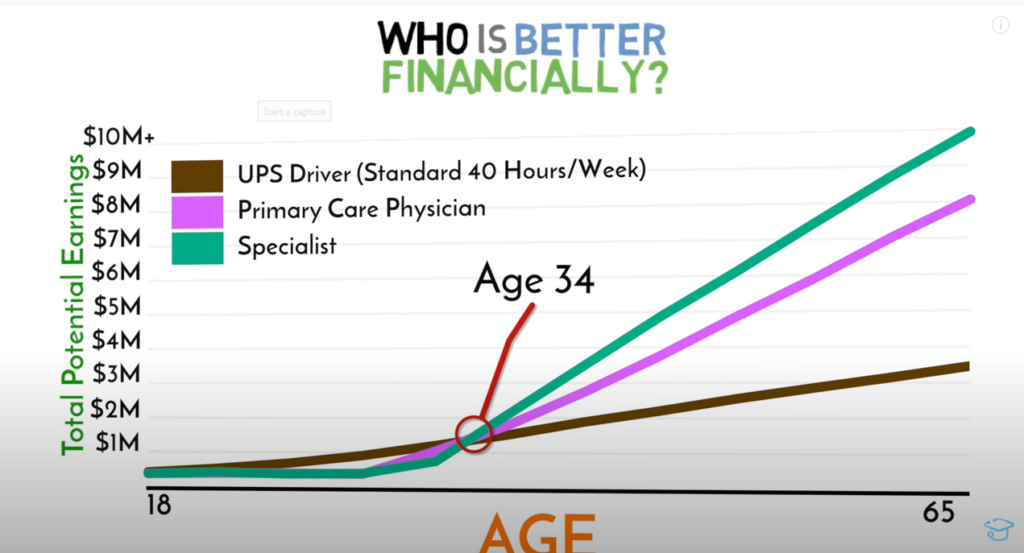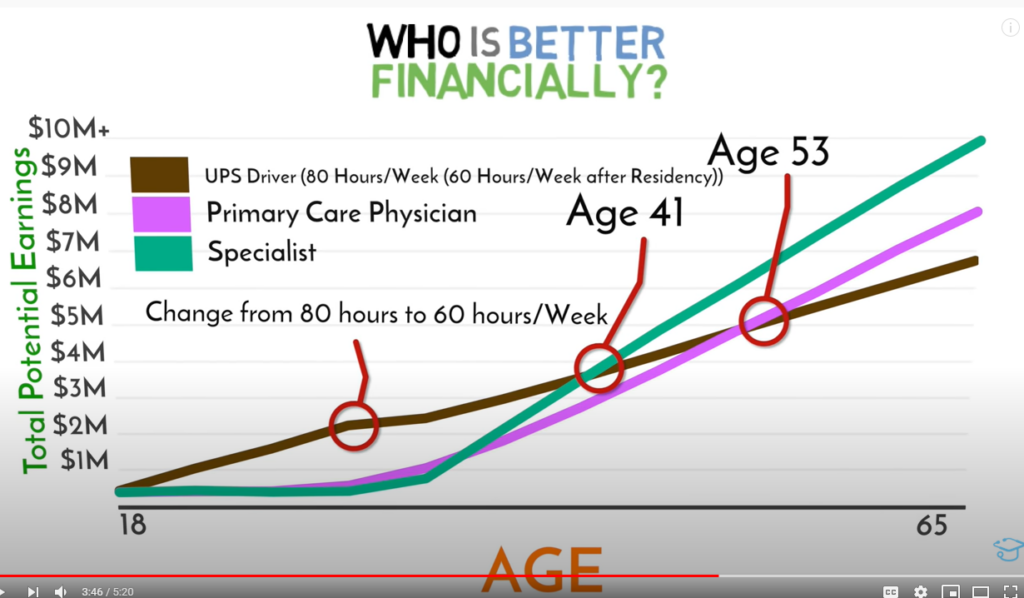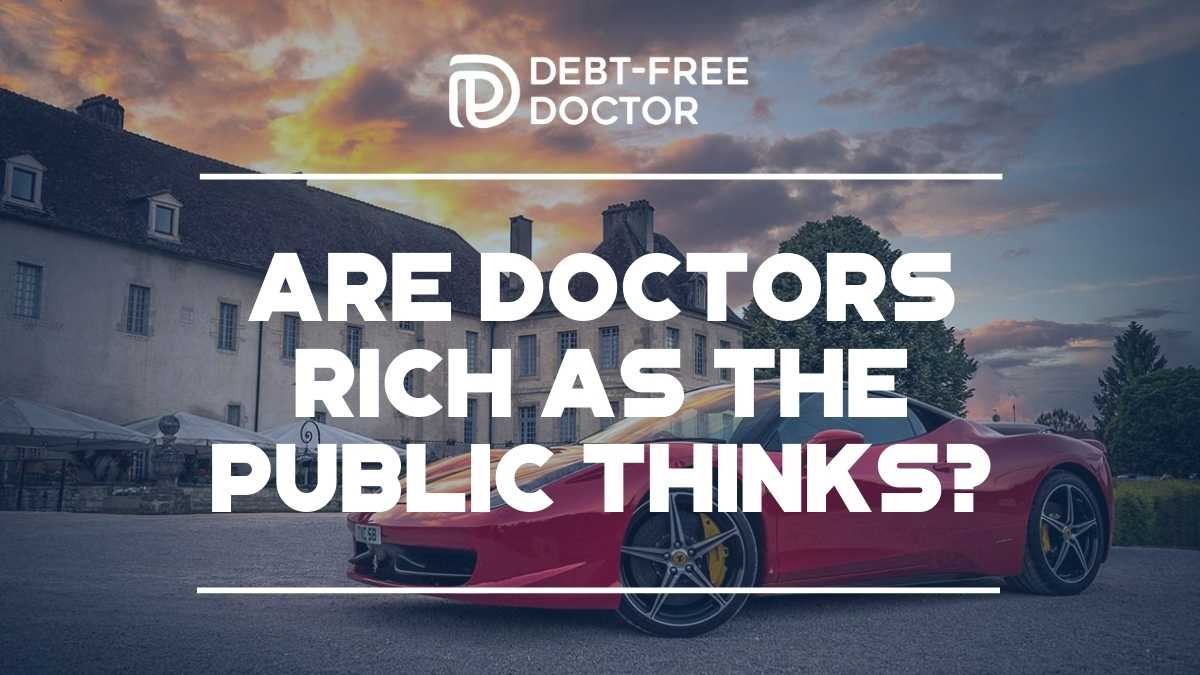Are Doctors Rich As The Public Thinks?

It seems as if the general public tend to assume that certain professionals are always well off. [You know what happens when you ASS-UME, right? :)]
This could be anything from an attorney, doctor or engineer.
But when a group of doctors were polled and asked, “Are doctors rich?”, you’d be surprised to learn that almost 70% said the public’s perception of their profession is false.

Dr. Ed Leap, ER physician, agrees with this statistic in an article he wrote in the Emergency Medicine News.
He states that there’s a general perception that the public automatically associates someone with a medical degree (MD) as having “Mucho Dinero“.
They don’t understand the high costs that many doctors enter medical school with such as hundreds of thousands of dollars of undergrad debt. Couple that with skyrocketing costs of years of medical school plus a late career start which makes it difficult to ever get ahead of the eight ball.
They’re always behind.
Leap points out that doctors typically have a high overhead and pay close to 50% in taxes (state, local, federal, sales). Also, they have to pay for all of the insurance that most of us need (life, health, auto) plus other mandatory costly plans such as malpractice insurance.
His point is that becoming a “rich doctor” continues to get harder all the time for the up-and-coming “rich doctors” as previously discussed.
He ends his article with this statement:
“We can put off the discussion as we have been for years, but the fundamental issue is this: To keep practicing medicine as it is, physicians will need to be paid more money or be required to pay less in education and in practice.
Otherwise, rich doctors (who are also smart doctors) will start to do the math. And when they do, they’ll realize that they simply can’t afford to do it anymore. Being rich is rapidly becoming just too expensive.”
His outlook for us doesn’t seem too promising.
Should You Have Been a UPS Driver Instead?
Med School Insiders performed an income analysis between a primary care doctors and UPS drivers. By the way, the video creator is a family doctor.
Here’s the Youtube video with the explanation below:
Let’s take a look and then decide if you should be asking yourself, “What can BROWN do for you?” 🙂
In the analysis, they made the following income assumptions:
- Primary Care Physicians (PCP) = $217,000
- Specialist = $316,000
- UPS Driver = $74,000
Also, they factored in that the average doctor attends:
- 4 years undergrad training (i.e. bachelor’s degree)
- 4 years medical school
- 3-7 years residency
Don’t forget about student loans!
They assumed an average of $185,000 of student loan debt.
Compound interest
They figured that each individual saved $5,500/year with an annual 7% return.
Doctors started saving later in life, roughly 10-12 years after the UPS driver began saving due to their lengthy education requirements.
Who’s better off financially?
UPS drivers working only 40 hours per week are better off financially, ahead of both PCP’s and specialists, until the age of 34.

Working longer hours
If a UPS driver works the same hours as a physician, it takes longer for physicians to catch up.
They made the assumption that overtime for a UPS driver = $45/hour.

You can see from the above graphic that it takes specialists until the age of 41 to catch up with UPS drivers.
Even worse for PCP’s, it takes them until the age of 53 to catch up financially (35 years after high school).
Join the Passive Investors CircleBottom line
After his detailed analysis, his conclusion is this:
“Don’t become a doctor for the money.”
If you were to ask him, “Are doctors rich?”, I guess he’d answer, “It depends on what stage of their career they’re in.”
High Earning Potential
Even before you started down the career path to become a medical doctor, you were probably aware that medical professionals typically have a high earning potential.
- Maybe that was the ONLY reason you chose your field?
- Maybe you wanted to help sick people and make a difference?
It doesn’t matter.
Your personal preferences are just that…personal.
Once you completed all of that hard work and received your first check, reality probably began to sink in to just how high your earning potential really was.
“Dang, I’m never seen so many zeroes in my life!!!!!!”

But does that automatically ensure that you’re going to be rich?
Having a good salary and being rich are two different things.
Being “rich” can mean different things to people.
For our purposes today, let’s consider that a rich doctor is one that has a high net worth instead of focusing only on the income.
Income vs Net Worth

Just because a doctor makes bank, it doesn’t automatically guarantee a high net worth.
Income is what you earn while net worth is what you OWN.
Big difference.
Net worth formula
Assets – Liabilities = Net Worth
Don’t Miss Any Updates. Each week I’ll send you advice on how to reach financial independence with passive income from real estate.
Sign up for my newsletterIn the book, The Millionaire Next Door, the authors stated that the best indicator of someone’s wealth was their net worth. So we’ll go with that for our purposes today.
Their research found that high income potential doctors were some of the worst accumulators of wealth.
When they compared them to others who earn similar incomes, doctors tend to have a smaller than expected net worth.
Their conclusion was that no matter what income someone earns, making accumulating wealth a priority helps ensure that a high net worth is possible.
It’s safe to say that if you make $300,000 a year and spend $25,000/month (like many doctors), becoming rich isn’t a priority.
Are Doctors Rich?
So the million dollar question is….are doctors rich?
Well it depends…
White coat investor
If you subscribe to Jim Dahle at the White Coat Investor, he’ll tell you that no, doctors aren’t rich due to 6 reasons:
#1 Get a late start
#2 High student loan debt
#3 Inadequate savings
#4 Failure to insure against a financial catastrophe
#5 Inappropriate investment plan
#6 Excessive investment costs
My Thoughts

In general, I feel that anybody living in the United States is rich compared to the rest of the world.
Americans live in the GREATEST country on the planet and for that reason, yes, we’re rich beyond belief.
With that being said, let’s take a specific look about what I feel and know about doctors and their finances.
Are doctors rich compared to the rest of the world?
Yes.
For the most part, they’ll always have an above average income and for this reason will be “richer” or “wealthier” than most.
Are they as rich as they should be?
No!
If I’d have to choose a reason why then I’d say it’s #5 on Dr. Dahle’s list above, “having an inappropriate investment plan”.
Even though doctors have a higher income, far too many have inappropriate investment plans for future wealth.
Think about it. If someone makes $250,000 a year, lives below their means and invests conservatively in index funds, then there’s no reason why they shouldn’t become rich.
They should also have extra money to invest like Robert Kiyosaki’s Rich Dad taught… for passive income in order to give them the option to retire early.
Unfortunately most don’t follow this type of advice and spend more than they earn.
What do you think?
Are doctors rich?
FAQs
Do doctors in private practice or specialties like orthopedic surgery and plastic surgery make much money compared to general practitioners?
Yes, there’s a significant difference in physician incomes based on specialty. Orthopedic surgeons and plastic surgeons, often working in private practice, are among the high-income earners in the medical field. In contrast, general practitioners, especially those in rural areas or working in teaching hospitals, tend to earn less. However, both groups typically make a good income compared to the general population.
Considering the cost of medical school, do young doctors today have enough money for a good living and personal financial stability?
While doctors do earn good money, the financial journey for medical school graduates can be challenging. The cost of medical education leaves many young doctors with much debt, impacting their bank accounts and monthly income for a long time. However, with good financial planning, including investments in the stock market and retirement accounts, most doctors can achieve financial success despite the initial debt.
How do the work hours and lifestyle of doctors affect their perceived wealth, especially in high-demand specialties like plastic surgery?
Doctors, particularly in specialties like plastic surgery or general surgery, often work long hours, impacting their lifestyle and personal time. While they earn high salaries, the demanding nature of their work and chronic conditions like stress can mean that their quality of life and time for enjoying wealth, like expensive cars or social media presence, might be less than expected.
What’s the real reason behind the perception of doctors being rich, and how does this compare to their actual financial status?
The perception of doctors being rich often comes from the general view of their high salaries and the status associated with the medical profession. However, when considering factors like medical school debt, long period of time needed for financial growth, and the costs associated with running a medical practice or insurance, the actual financial status of doctors, especially those in their residency program or as average residents, can be more modest than assumed.
With the most recent data, how does the average physician’s annual income compare to other high-income earners in the U.S.?
According to the most recent data, the average physician’s annual income is indeed higher than many other professions in the U.S. However, when compared with other high-income earners, especially those in the private sector or with less educational debt, doctors may not always come out ahead. Factors like the length of medical education, the real reason behind their choice of specialty, and the cost of maintaining a medical practice or private school for family members can impact their overall financial standing.


